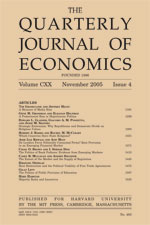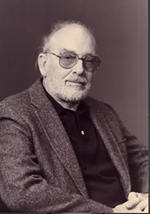Related Research Articles

Kenneth Joseph Arrow was an American economist, mathematician, writer, and political theorist. He was the joint winner of the Nobel Memorial Prize in Economic Sciences with John Hicks in 1972.

Joseph Eugene Stiglitz is an American New Keynesian economist, a public policy analyst, and a full professor at Columbia University. He is a recipient of the Nobel Memorial Prize in Economic Sciences (2001) and the John Bates Clark Medal (1979). He is a former senior vice president and chief economist of the World Bank. He is also a former member and chairman of the Council of Economic Advisers. He is known for his support for the Georgist public finance theory and for his critical view of the management of globalization, of laissez-faire economists, and of international institutions such as the International Monetary Fund and the World Bank.

"The Market for 'Lemons': Quality Uncertainty and the Market Mechanism" is a widely cited seminal paper in the field of economics which explores the concept of asymmetric information in markets. The paper was written in 1970 by George Akerlof and published in the Quarterly Journal of Economics. The paper's findings have since been applied to many other types of markets. However, Akerlof's research focused solely on the market for used cars.

In economics, insurance, and risk management, adverse selection is a market situation where buyers and sellers have different information. The result is the unequal distribution of benefits to both parties, with the party having the key information benefiting more.

In contract theory and economics, information asymmetry deals with the study of decisions in transactions where one party has more or better information than the other.

Sir James Alexander Mirrlees was a British economist and winner of the 1996 Nobel Memorial Prize in Economic Sciences. He was knighted in the 1997 Birthday Honours.
Information economics or the economics of information is the branch of microeconomics that studies how information and information systems affect an economy and economic decisions.
Constantine Christos "Costas" Azariadis is a macroeconomist born in Athens, Greece. He has worked on numerous topics, such as labor markets, business cycles, and economic growth and development. Azariadis originated and developed implicit contract theory.

The Quarterly Journal of Economics is a peer-reviewed academic journal published by the Oxford University Press for the Harvard University Department of Economics. Its current editors-in-chief are Robert J. Barro, Lawrence F. Katz, Nathan Nunn, Andrei Shleifer, and Stefanie Stantcheva.
Sanford "Sandy" Jay Grossman is an American economist and hedge fund manager specializing in quantitative finance. Grossman’s research has spanned the analysis of information in securities markets, corporate structure, property rights, and optimal dynamic risk management. He has published widely in leading economic and business journals, including American Economic Review, Journal of Econometrics, Econometrica, and Journal of Finance. His research in macroeconomics, finance, and risk management has earned numerous awards. Grossman is currently Chairman and CEO of QFS Asset Management, an affiliate of which he founded in 1988. QFS Asset Management shut down its sole remaining hedge fund in January 2014.

David Cass was a professor of economics at the University of Pennsylvania, mostly known for his contributions to general equilibrium theory. His most famous work was on the Ramsey–Cass–Koopmans model of economic growth.
Screening in economics refers to a strategy of combating adverse selection – one of the potential decision-making complications in cases of asymmetric information – by the agent(s) with less information.
George Lennox Sharman Shackle was an English economist. He made a practical attempt to challenge classical rational choice theory and has been characterised as a "post-Keynesian", though he is influenced as well by Austrian economics. Much of his work is associated with the Dempster–Shafer theory of evidence.
Credit rationing by definition is limiting the lenders of the supply of additional credit to borrowers who demand funds at a set quoted rate by the financial institution. It is an example of market failure, as the price mechanism fails to bring about equilibrium in the market. It should not be confused with cases where credit is simply "too expensive" for some borrowers, that is, situations where the interest rate is deemed too high. With credit rationing, the borrower would like to acquire the funds at the current rates, and the imperfection is the absence of supply from the financial institutions, despite willing borrowers. In other words, at the prevailing market interest rate, demand exceeds supply, but lenders are willing neither to lend enough additional funds to satisfy demand, nor to raise the interest rate they charge borrowers because they are already maximising profits, or are using a cautious approach to continuing to meet their capital reserve requirements.
In neoclassical economics, a market distortion is any event in which a market reaches a market clearing price for an item that is substantially different from the price that a market would achieve while operating under conditions of perfect competition and state enforcement of legal contracts and the ownership of private property. A distortion is "any departure from the ideal of perfect competition that therefore interferes with economic agents maximizing social welfare when they maximize their own". A proportional wage-income tax, for instance, is distortionary, whereas a lump-sum tax is not. In a competitive equilibrium, a proportional wage income tax discourages work.
Dynamic stochastic general equilibrium modeling is a macroeconomic method which is often employed by monetary and fiscal authorities for policy analysis, explaining historical time-series data, as well as future forecasting purposes. DSGE econometric modelling applies general equilibrium theory and microeconomic principles in a tractable manner to postulate economic phenomena, such as economic growth and business cycles, as well as policy effects and market shocks.
Public economics(or economics of the public sector) is the study of government policy through the lens of economic efficiency and equity. Public economics builds on the theory of welfare economics and is ultimately used as a tool to improve social welfare. Welfare can be defined in terms of well-being, prosperity, and overall state of being.
Jacques H. Drèze was a Belgian economist noted for his contributions to economic theory, econometrics, and economic policy as well as for his leadership in the economics profession. Drèze was the first President of the European Economic Association in 1986 and was the President of the Econometric Society in 1970.
In economics, implicit contracts refer to voluntary and self-enforcing long term agreements made between two parties regarding the future exchange of goods or services. Implicit contracts theory was first developed to explain why there are quantity adjustments (layoffs) instead of price adjustments in the labor market during recessions.
Optimal capital income taxation is a subarea of optimal tax theory which studies the design of taxes on capital income such that a given economic criterion like utility is optimized.
References
- ↑ Rothschild, Michael (1969). Essays in economic theory (PDF) (Ph.D.). MIT . Retrieved 30 October 2016.
- ↑ Rothschild, Michael; Stiglitz, Joseph E. (November 1976). "Equilibrium in competitive insurance markets: an essay on the economics of imperfect information". The Quarterly Journal of Economics . 90 (4): 629–49. doi:10.2307/1885326. JSTOR 1885326.
- ↑ Rothschild, Michael; Stiglitz, Joseph E. (September 1970). "Increasing risk: I. a definition". Journal of Economic Theory. 2 (3): 225–43. doi:10.1016/0022-0531(70)90038-4.
- ↑ Studies of Supply and Demand in Higher Education. 1993.
{{cite book}}:|website=ignored (help) - ↑ Rothschild, Michael; Diamond, Peter (1978). Uncertainty in Economics: Readings and Exercises.
- ↑ "Uncertainty in economics: Readings and exercises (Economic theory and mathematical economics)". Thrift Books.